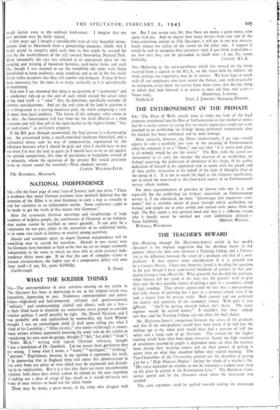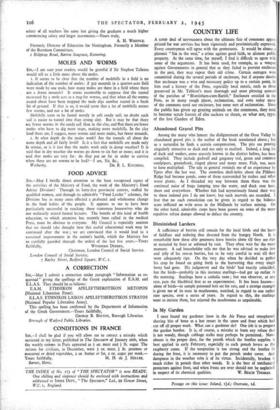THE TEACHER'S REWARD
SIR,—Running through Mr. Hurlstone-Jones's article in last week's Spectator is the implied suggestion that the deciding factor in the parents' choice for their sons between a Training College and a Univer- sity is the difference between the salary of a graduate and that of a non- graduate. It may receive some consideration if it is pointed out by a Careers Master. I have not, however, found it deciding the question in the past though I have interviewed hundreds of parents in that con- nexion during a long official life. What generally has decided the question, when finance did not stand in the way, was the parents' wish to give their sons the best possible chance of getting a post in a secondary school of high standing. They always appreciated the fact that a non-graduate had little chance of anything but a post in a primary school, even if he took a degree later by private study. Both parents and son preferred the dignity and amenities of the secondary school. With girls it was different. " She'll be getting married before she's thirty. The extra expense would be wasted money." It wouldn't, but they seldom saw that, and the Training College was too often the final choice.
Mr. Hurlstone-Jones's comparison between the salary of the graduate and that of the non-graduate would have been fairer if he had put the retiring age at 62, when each would have had a pension of half the salary and a lump sum of go thirtieths. The reward for the higher training would have then been more attractive. Surely the high standard of attainment reached by pupils is dependent more on what the teachers learn during their teaching careers and on their powers of getting it across than on what they absorbed before they started teaching. The Vice-Chancellors of the Universities pointed out the absurdity of paying £5o for a " High Honours Degree " during the whole of a teacher's life. "His value depended on whether or not he remained a student more than on the place he gained in the Examination Lists." The Burnham Com- mittee agreed and let the allowance cease when the maximum was reached.
The same argument could be applied towards making the maximum salary of all teachers the same but giving the graduate a much higher commencing salary and larger increments.—Yours truly,
A. H. WHIPPLE.
Formerly Director of Education for Nottingham. Formerly a Member of the Burnham Committees.
Ridgway Road, Barton Seagrave, Kettering.



























 Previous page
Previous page